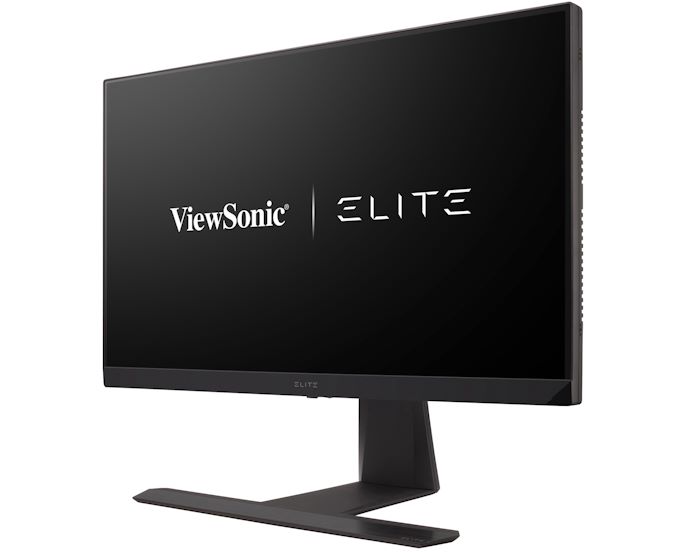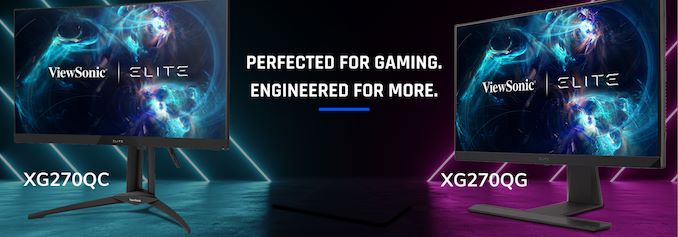Supersonic: ViewSonic’s Elite XG270 240 Hz IPS Monitor w/ VRR & HDR
by Anton Shilov on September 27, 2019 3:00 PM EST
Aiming at demanding hardcore and esports gamers, ViewSonic this week introduced its new gaming display that uses a ‘fast IPS’ panel with a 240 Hz maximum refresh rate. The Elite XG270 is among the first monitors in the industry to offer a unique combination of rich colors, wide viewing angles, HDR10, and a variable refresh rate of up to 240 Hz.
The ViewSonic Elite XG270 is based a 27-inch panel featuring a 1920×1080 resolution along with all the features that the ‘fast IPS’ technology is known for today, including 400 nits brightness, a 1000:1 contrast ratio, 178°/178° viewing angles, a 1 ms GtG response time. The monitor can display 16.7 million of colors and reproduce 99% of the sRGB color space, which is in line with other LCDs using the same panel.
For hardcore gamers, the key feature of the Elite XG270 is its variable refresh rate of up to 240 Hz. In an official document, the monitor supports VESA’s Adaptive Sync technology, yet in its press release ViewSonic claims AMD’s FreeSync support, which may indicate that the company has submitted the monitor to AMD for certification and fully expects it to pass it as the vast majority of Adaptive Sync-enabled displays can do it. Considering the fact that the monitor will be available only several weeks from now, the company has time.
The monitor also fully supports HDR10, so console gamers with HDR10-supporting titles will probably be pleased, even though its level of luminance is considered rather low for HDR, so the actual HDR user experience is something that remains to be seen.
As added bonuses, the Elite XG270 display comes with 3 W stereo speakers (and probably a headphone output too), an Elite display controller, a mouse bungee, and a headphone hook. Unfortunately, right now ViewSonic does not disclose what kind of display inputs the monitor has, though it is reasonable to expect at least a DisplayPort and an HDMI.
| The ViewSonic Elite IPS LCD with a 240 Hz Refresh Rate | ||
| Elite XG270 | ||
| Panel | 27-inch class IPS | |
| Native Resolution | 1920 × 1080 | |
| Maximum Refresh Rate | 240 Hz | |
| Dynamic Refresh | Technology | AMD FreeSync VESA Adaptive Sync |
| Range | ? | |
| Brightness | 400 cd/m² | |
| Contrast | 1000:1 | |
| Viewing Angles | 178°/178° horizontal/vertical | |
| Response Time | 1 ms GtG | |
| Pixel Pitch | ~0.27675 mm² | |
| Pixel Density | ~82 PPI | |
| Color Gamut Support | 99% sRGB | |
| Inputs | ?×DP 1.2 ?×HDMI 2.0 |
|
| Audio | 3 W speakers headphone out |
|
| Stand | ? | |
| Warranty | ? years | |
| MSRP | $429.99 | |
ViewSonic’s Elite XG270 gaming display will be available in November at an estimated retail price of around $429.99, which is considerably below MSRP of Dell’s Alienware 27 (AW2720HF) that features similar key characteristics (27-inch, fast IPS, 240 Hz) yet sells for $599.99.
Related Reading:
- Fast & Furious: The Alienware 27 (AW2720HF) 240 Hz IPS Monitor with FreeSync
- Need for Speed: The LG UltraGear (27GN750) 240 Hz IPS Monitor with G-Sync
- HP's Omen X 27: A 240Hz QHD Monitor with FreeSync 2 HDR
- Samsung’s CRG5 Curved 27-Inch 240 Hz G-Sync Monitor Now Available for $370
- Acer Launches Predator XN253QX Monitor with 240 Hz & 0.4 ms G2G Response Time
- AOC’s Agon Monitors with 0.5ms Response Time & 240 Hz Refresh Now Available
Source: ViewSonic
Note: Image is for illustrative purposes only











35 Comments
View All Comments
Drkrieger01 - Friday, September 27, 2019 - link
While I agree, 1080p should be on the way out, you need to remember that 4K gaming can only be run smoothly at 60fps if you're rocking a 2080 Ti. Now if you're trying to run 4K @ 240Hz... good luck. 2.5k @ 120Hz, sure, but 240 is a butt load of frames to crank out.Any mathematicians out there wanna do the math on the bandwidth required for 4K@240Hz? It'll blow all your minds.
Robert Pankiw - Friday, September 27, 2019 - link
No need to do the math. Wikipedia has it all, as do the DisplayPort and HDMI websites.1080p@240hz is 17.5Gbit/s
4k@240Hz is 68.5Gbit/s
https://en.wikipedia.org/wiki/DisplayPort#Refresh_...
DisplayPort 1.4 can handle around 25Gbit/s after encoding (2.0 can do 77Gbit/s)
HDMI 2.0 can do a little less than 15Gbit/s. The 2080ti has DP1.4 and HDMI 2.0b
Doing this monitor at 4k is not possible at 240Hz
Note: 1440p @ 240hz is over 30Gbit/s, so still not an option
Guspaz - Saturday, September 28, 2019 - link
Workarounds for DisplayPort bandwidth limitations: using two DisplayPort streams instead of one, using display stream compression, using chroma sub sampling, using DisplayPort 2.0. Now, some of these things either aren’t available (DP2 isn’t yet, and has anybody ever seen DSC in the wild? It was optional in DP 1.4) or have an impact on visual fidelity, but people plugged two DP cables in to drive 4K monitors in the past, so there’s no reason why that can’t still be done.Socius - Friday, September 27, 2019 - link
It's not so bad, in terms of bandwidth. It's the same as 8K at 60Hz, which is doable by splitting the display input across 2 separate inputs using HDMI 2 or Displayport 1.4. Or with a single input on HDMI 2.1 and Displayport 2.GPU power to handle that though? Lol...impossible. You'd need the power to render a 1080p image at 1000fps to be able to hit 240Hz at 4K. That would require a card that has the rendering power of 3-5 RTX Titan cards to be able to maintain that frame rate in competitive fps titles.
imaheadcase - Saturday, September 28, 2019 - link
Again, i'm not saying 4k has to be it, more better options than this monitor, but i have played Apex Legends on 4k on my 1080TI and played just fine on it. Do people not know computers have so many options to scale anymore..erple2 - Tuesday, October 15, 2019 - link
If you're running at 4k, do you really need FSAA or any amount of AA? Wouldn't the sheer quadrupling of available pixels be enough to mitigate any problems with FSAA? Also, do competitive gamers actually use any AA in their games? Or is FPS truly king?Haswell1150 - Friday, September 27, 2019 - link
Agreed!!! 24" at 1080P or 27" at 1440P.lilkwarrior - Friday, September 27, 2019 - link
Dolby Vision or GTFOlilkwarrior - Friday, September 27, 2019 - link
*On top of HDR10+Guspaz - Saturday, September 28, 2019 - link
HDR10+ and DolbyVision are pointless on a display with a 1000:1 contrast ratio.